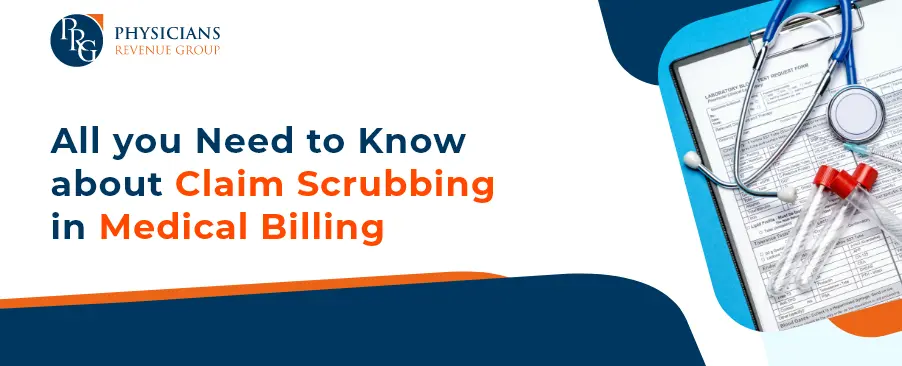
Email: info@prgmd.com | Call: +1 (630) 242-6474
Business hours: 9:00 to 5:00 | Monday to Friday
Email: info@prgmd.com | Call: +1 (630) 242-6474
Business hours: 9:00 to 5:00 | Monday to Friday

Table of Contents
ToggleHealthcare providers spend their lifetimes perfecting their craft and assisting patients to live more meaningful lives. However, in all those years of learning, they probably did not take training to process claims or even get payers/patients to pay their bills in full. When physicians and their practices lack the expertise and experience to fill out medical claims correctly, the insurance providers can end up rejecting those claims. With that begins a new back-and-forth process, which can cost your practice time and money. This is your clue to adopt claim scrubbing solutions. A wrong claim processing takes a massive bite out of your practice revenue, with one study suggesting the average cost of reworking a denied claim is $118. While medical billing services are a solution to all of this – today, let’s learn more about claims scrubbing, its importance, and some common terminologies.
The process of scrubbing involves checking claims before submission to the payers. Doing so ensures that all claims are:
The claim-scrubbing process increases the chances that an insurer will pay each claim quickly. In the past, patient collection and claim scrubbing were tedious processes. In particular, the claims scrubbing was undertaken manually – in a long, tedious process, especially for larger practices.
But now, with the digitization of healthcare billing, more healthcare providers are spending on efficient claim scrubbing tools while partnering with third-party medical billing companies – to accelerate the process. Having the right solutions and tools in place, healthcare practices like yours can get the peace of mind that comes with knowing that their reimbursements will be faster and complete and that every claim filed for their services is accurate.
The major benefit of claim-scrubbing is its results, which increase the accuracy of insurance claim submissions. The more often your claim submissions are accurate, the fewer denials there will be. Consequently, you will encounter fewer and fewer obstacles in getting timely and complete reimbursements from insurance companies.
Claim denials can affect the reimbursement process and delay the payment process. However, with a strong claim scrubbing process, your practice is far more likely to submit clean and accurate claims right on the first try. This leads insurance providers to make timely payments for your care services. The claims scrubbing process increases the RCM cash flow, which your practice can use to meet its needs.
Recurring claim denials affect the insurance payers, and patients get annoyed when claims are denied.
Consider this: after going to your doctor and going through treatments, wouldn’t you be annoyed if you received a bill for services you expected to be covered? A healthcare practice whose patient regularly experience such instances risks losing their clientele.
Claim-scrubbing lowers the risks of claim denials, and your patients will be more likely to get the coverage they expect for your services. When your practice meets patient expectations, they are more likely to become your returning customers. Thus, between patient retention and the accelerated claims process, your healthcare practice will be looking at more practice revenue, that too, more quickly.
As the claims scrubbing tools and services help healthcare practices with faster processes and as the scrubbed claims are less likely to be denied or rejected, the investment in claim scrubbing services enhances your overall RCM efficiency.
As opposed to spending long hours manually scrubbing claims or resubmitting rejected claims, your team can focus on more important aspects of your business.
Share:
Categories
Recently Added

What is an ABN in medical billing?

What does a Clearinghouse do During Claims Submission?

What is EOR in Medical Billing?
We Would Love to Assist You!
We treat your data confidentially and don’t share any information with a third party.